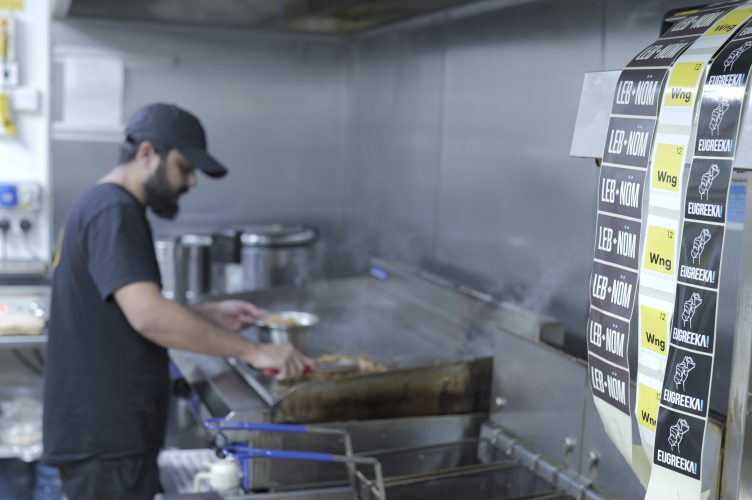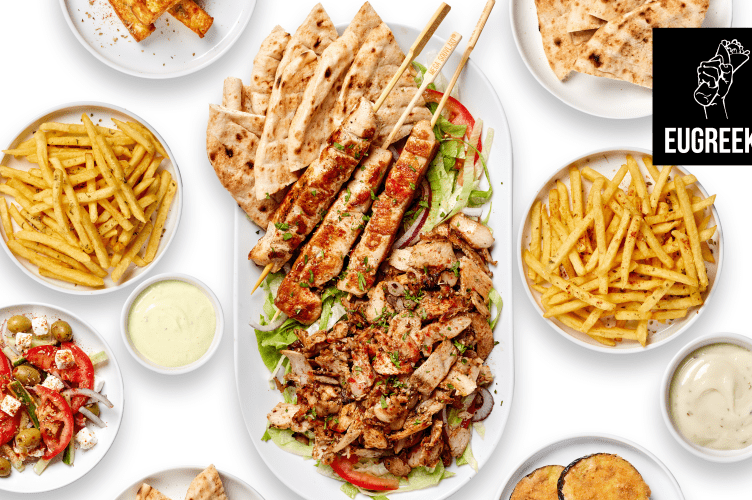See how Dish’d partners turned spare kitchen space into £2–£3.4K/week in profit with easy prep, high-performing brands, and full support.
Introduction

Across the UK, restaurant operators are asking the same question: “How do I make my kitchen more profitable when dine-in trade is falling, but costs keep rising?” The answer many are discovering is simple, virtual brands.
Dish’d has helped dozens of independent operators and franchisees turn underused kitchens into delivery-first success stories, adding £2,000–£3,400 in weekly profit without the risk of opening a new site.
These are not theories, they’re real results from halal food franchise partners who combined their existing teams and equipment with Dish’d’s proven model. From dark kitchen profits to dark kitchen margins, the numbers speak for themselves.
In this blog, we’ll share:
- The challenge kitchens face today.
- How operators discovered Dish’d.
- Real case studies of virtual brands UK success.
- The exact numbers behind weekly sales and margins.
- Why Dish’d’s model works when others don’t.
If you’ve wondered “How much can I make with a virtual food brand?” or searched for “real stories of restaurant dark kitchens making profit”, this guide will give you the answers.
The Challenge: Spare Capacity, Rising Costs, and a Shifting Market
The economics of underused kitchens
Many operators face the same problem: fixed costs stay high while dine-in trade declines. Rent, energy, and staff wages don’t shrink just because footfall does. For restaurants with downtime or quiet hours, this means valuable kitchen capacity is left unused.
Fixed costs vs. declining dine-in trade
Even successful franchise partners in the UK report that sit-down orders alone no longer cover overheads. Delivery is now the growth engine, yet many kitchens still aren’t set up to capture that demand effectively.
Consumer shift to delivery + convenience
Customer habits have changed permanently. Gen Z and Millennials often default to apps like Uber Eats and Deliveroo when deciding what to eat. These diners don’t search for a local high street restaurant, they search for delivery-only brands. The result is a structural shift in where revenue is generated.
Halal kitchens in particular: a growth segment ready for action
Halal operators face a unique opportunity.Demand for halal food franchise options is rising quickly, but there’s still limited supply on major platforms. Kitchens that are fully halal compliant, FSA rated, and alcohol-free can capitalise on this underserved segment while keeping their own core brand intact.
In short, the dark kitchen opportunity exists because restaurants are sitting on spare capacity while customer behaviour has shifted. The question is whether they use that space to cover costs, or turn it into a new profit stream.
The Turning Point: Discovering the Dish’d Opportunity
What made Dish’d stand out
When operators first hear about virtual brands UK, many are sceptical. They’ve seen other dark kitchen companies promise easy profits but deliver high marketing costs, inconsistent menus, or lack of support. Dish’d flips that model. Partners get:
- Pre-launch planning – kitchen layouts, equipment checks, and forecast guidance.
- Plug-and-play menus – simple dishes that don’t slow down existing service.
- Halal compliance – built into every brand.
- Ongoing support – training, marketing, and platform optimisation.
This combination removes the pain points that made earlier dark kitchen profit margins unsustainable.
How operators discovered Dish’d
Most partners came across Dish’d through referrals, targeted outreach, or direct recommendations from fellow operators. The story is often the same: they had spare capacity but weren’t sure how to monetise it. Dish’d provided a tested system with results to back it up.
From scepticism to buy-in
At first, many questioned whether the food delivery franchise model could really deliver the promised returns. Would delivery platforms favour established names? Would menus be too complex? Would the margins hold up?
The difference came after the first few weeks of orders. Operators saw steady volumes, professional branding, and margins that actually held. What began as an experiment quickly became a core profit stream.
“It’s low investment as you already have the bricks-and-mortar. That makes it a no-brainer. What Dish’d promise, happens,” – Dixy Fried Chicken partner, London.
Meet the Operators: Real Kitchens, Real Results
One of the clearest Dish’d success stories comes from Umar Kanagaratnam, a Dixy Fried Chicken franchisee in Leyton, London. Like many operators, Umar faced the challenge of high fixed costs and competitive local trade; within a one-mile radius, there were more than 15 chicken shops, including McDonald’s, KFC, and Popeyes.
By adding Dish’d’s virtual food brands into his existing Dixy kitchen, Umar unlocked a completely new revenue stream without changing his core business.
“Last week we broke the record, just over £9,000 in additional sales. You can’t go wrong.”
Customers walking into his Dixy store had the same experience as always. But behind the counter, his team were also preparing delivery orders for Eugreeka! (Greek classics) and Leb+Nom (Lebanese classics) on Uber Eats, Deliveroo, and Just Eat.
The results came quickly:
- Immediate sales lift from the first week of going live.
- Halal compliance maintained across all menus.
- No new overheads, just smarter use of his existing staff and equipment.
Umar now considers Dish’d an essential part of his future plans:
“I’m going to open more stores, and I’m going to implement this wherever I go.”
His story proves the value of delivery-only brands success when combined with the right partner: simple operations, halal alignment, and measurable dark kitchen profits.
The Numbers: From First Orders to Five Figures
Operators often ask: “How much can I make with a virtual food brand?” Umar’s results show how quickly Dish’d partners can scale.
From launch to growth
- Week 1 – steady initial orders as menus go live on Deliveroo, Uber Eats, and Just Eat. Typical Dish’d partners see £3,000–£5,000 per week in sales once listed.
- Months 2-3 – volumes build as platforms promote high-rated brands. At this stage, weekly sales often reach £9,000–£15,000, translating into £2,000–£3,400 profit per week.
Weekly performance snapshot
| Metric | Average Result | Why It Matters |
|---|---|---|
| Orders per week | 300–450 | Steady, repeatable demand across platforms. |
| Average Order Value (AOV) | £22–£26 | Driven by combos, platters, and add-ons. |
| Gross margins | ~75% | Food & packaging costs average 25% of sales. |
| Weekly profit uplift | £2K–£3.4K | Consistent profit added to existing restaurant sales. |
What drives the numbers
- Combos and platters – bundles increase basket size.
- Top-sellers – chicken souvlaki plates, loaded fries, halloumi sides, and shakes.
- Halal menus customer reach on delivery apps.
For Umar, it meant turning underused capacity into a five-figure monthly revenue stream, without opening a new site. These are the real dark kitchen profit margins that make Dish’d stand out from generic dark kitchen companies.
What Made the Difference: Why Dish’d Worked

Pre-launch planning
Many operators fail with virtual brand concepts because they underestimate set-up. Dish’d invests time upfront, planning kitchen layouts, checking equipment, and forecasting sales, so partners launch with confidence rather than trial and error.
Plug-and-play menus + centralised sourcing
Dish’d menus are built for speed. With a fryer and griddle, kitchens can prepare dishes in minutes. Pre-portioned ingredients reduce waste, while centralised sourcing keeps costs predictable. This model supports consistent dark kitchen profit margins week after week.
Training and brand marketing done for you
Every Dish’d partner receives training to get staff delivery-ready. But the real differentiator is branding. Unlike many dark kitchen companies that leave marketing to operators, Dish’d provides:
- Professional menu photography.
- Branded packaging and marketing assets.
- Platform support to help brands rank on Uber Eats and Deliveroo.
Delivery platforms managed by Dish’d
Integration across Deliveroo, Just Eat, and Uber Eats is handled by Dish’d, saving operators time and ensuring their virtual food brands perform from day one.
Halal compliance & FSA alignment
Dish’d’s halal food franchise model ensures every partner meets halal requirements and holds an FSA rating of 3 or higher. This compliance isn’t just a selling point, it’s a competitive advantage in delivery markets where halal options are limited.
Ongoing support
Dish’d doesn’t stop at launch. Partners receive regular operational support, sales reviews, and growth forecasts. It’s why so many operators credit Dish’d as the difference between experimenting with a virtual restaurant concept and running a sustainable new revenue stream.
For more on how Dish’d supports partners, see Why Dish’d.
Is Your Kitchen Next? How to Start the Dish’d Journey
What Dish’d looks for in a partner
Not every kitchen is the right fit, Dish’d partners are chosen for quality and ambition. Ideal operators are:
- Halal-compliant (no alcohol on site).
- FSA-rated 3 or higher.
- Commercially equipped with extraction, gas or 3-phase electricity.
- Growth-oriented, ready to scale delivery sales.
Kitchen setup requirements
The equipment list is minimal: a fryer, a griddle, and prep space. With these basics, most kitchens can run multiple virtual food brands without disruption to their existing business.
How to enquire
The process is straightforward:
- Book a call with the Dish’d team.
- Site check & forecast – Dish’d analyses your kitchen capacity and predicts sales.
- Onboarding & training – usually complete in less than a week.
- Go live – menus are integrated across Uber Eats, Deliveroo, and Just Eat.
When to expect results
Partners often see their first orders within days of going live. By Month 1, many are already generating thousands in extra weekly revenue. By Month 3, dark kitchen profits of £2,000–£3,400 per week are common across the network.
Ready to explore the opportunity? Become a Franchisee and see how Dish’d can turn your spare capacity into one of the UK’s most profitable delivery-only brand success stories.
Conclusion
Spare kitchen space doesn’t have to sit idle. With Dish’d, operators across the UK are proving that virtual brands can turn quiet hours into consistent income. From Dixy Fried Chicken in London to independent takeaways nationwide, partners are adding £2,000–£3,400 profit per week while keeping their core businesses running.
These are real Dish’d success stories, kitchens that faced rising costs and shifting consumer habits, then discovered the power of delivery-first dining. By combining halal food franchise compliance, plug-and-play menus, and full support, Dish’d makes it easy to capture the benefits of dark kitchen profit margins without the risks that sank many early dark kitchen operators.
The takeaway is simple: virtual brands are no longer experimental. They’re a proven path to growth.
Want to see if your kitchen qualifies? Become a Franchisee or Let’s Chat and explore how Dish’d can help you join the UK’s most successful network of virtual brands.


